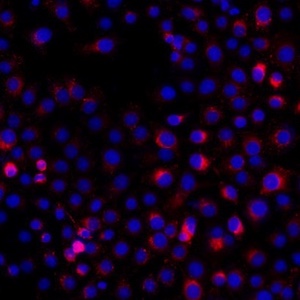 Smart Citations
Smart CitationsSee how this article has been cited at scite.ai
scite shows how a scientific paper has been cited by providing the context of the citation, a classification describing whether it supports, mentions, or contrasts the cited claim, and a label indicating in which section the citation was made.
Tumor cells-derived exosomal PD-L1 promotes the growth and invasion of lung cancer cells in vitro via mediating macrophages M2 polarization
Lung cancer originating from the bronchial epithelium is the most common lung malignancy. It has been reported that programmed cell death 1 ligand 1 (PD-L1) and tumor-associated macrophages are closely related to the development of lung cancer. However, whether tumor-derived exosomal PD-L1 could mediate the regulation of macrophage polarization in lung cancer remains unclear. For this research, the level of PD-L1 in normal tissues and lung cancer tissues was evaluated using RT-qPCR. Next, the apoptosis of lung cancer cells was evaluated using flow cytometry assay. Then, the structure and morphology of vesicles were observed using transmission electron microscopy and nanoparticle tracking analysis. Later on, the internalization of exosomes by macrophage was observed using fluorescence microscopy. Our results showed that the level of PD-L1 was upregulated in tumor tissues and lung cancer cells. Knockdown of PD-L1 notably inhibited the viability, migration and invasion of lung cancer cells. In addition, lung cancer cells-derived exosomal PD-L1 could be absorbed by macrophages. Meanwhile, exosomal PD-L1 was able to promote macrophages M2 polarization. Moreover, macrophages M2 polarization induced by exosomal PD-L1 further remarkably promoted the viability, migration, invasion, and epithelial-mesenchymal transition process of lung cancer cells. Collectively, knockdown of PD-L1 notably inhibited the viability, migration and invasion of lung cancer cells. Tumor cell-derived exosomal PD-L1 could promote the growth of lung cancer cells by mediating macrophages M2 polarization. Thus, inhibiting macrophages M2 polarization might be a promoting therapy for the treatment of lung cancer.
Edited by
this study was approved by Ethics Committee of the Zhejiang Provincial People’s Hospital, People’s Hospital of Hangzhou Medical College, with approval document no. 2021008Supporting Agencies
Foundation of Zhejiang Provincial Scientific Research on Traditional Chinese Medicine , General Project Funds from the Health Department of Zhejiang Province, Foundation for Natural Science of Zhejiang ProvinceHow to Cite

This work is licensed under a Creative Commons Attribution-NonCommercial 4.0 International License.
PAGEPress has chosen to apply the Creative Commons Attribution NonCommercial 4.0 International License (CC BY-NC 4.0) to all manuscripts to be published.








